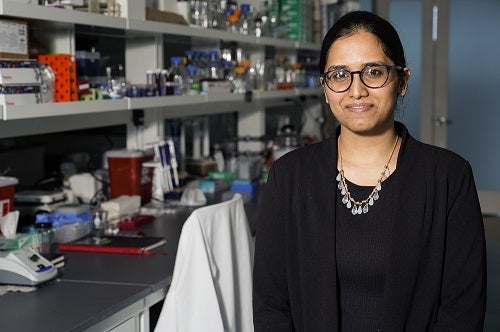Investigator Focus
Jyothi U, Menon, PhD – Cancer Moonshot Scholar
Dr. Jyothi U. Menon has the prestigious honor of being one of eleven researchers selected to the inaugural cohort of the Biden Cancer Moonshot Scholars program! The National Institutes of Health 5-year (2023-2028) R01/R37 award, from the National Cancer Institute is entitled “Multifunctional Nanoparticle Platform to Prevent Alcohol-Associated HCC Development” totals $2 million and is Menon’s second NIH award. An Associate Professor in the departments of Biomedical and Pharmaceutical Sciences and Chemical Engineering at the University of Rhode Island, earned her first NIH award in 2020, an R21 entitled “Nanoparticle-mediated targeting of hepatic macrophages to mitigate inflammation in alcoholic liver disease” by the National Institute on Alcohol Abuse and Alcoholism, and totaling $413,437.

Menon’s research specializes in nanomedicine, drug delivery, biomaterials and tissue engineering. Her laboratory research group has developed targeted drug delivery strategies to provide site-specific and combination therapies to treat chronic lung and liver inflammatory disorders and prevent their progression to cancer. They are also harnessing their expertise in tissue engineering to develop bioinspired microenvironments for in vitro disease modeling.
Menon shared, “I was always interested in biology and chemistry thanks to the really great teachers I had in high school. I also enjoyed doing experiments in our high school laboratory – I still remember the sense of accomplishment I felt when I was the first in my class to successfully prepare a cross-section of a flower and look at it under the microscope! These experiences drew me towards a career in research.”
The Path to Research
Dr. Menon received her bachelor’s and master’s degree in biomedical engineering from a joint program at the University of Texas (UT) Southwestern Medical Center, Dallas and UT Arlington. Her keen interest in tissue engineering led her to join Professor Kytai Nguyen’s Nanomedicine and Tissue Engineering laboratory, her first introduction to the field of nanomedicine. Jyothi said, “I was amazed by how these really tiny particles that are about a 1000 times smaller than the diameter of a single human hair, can be used to carry and deliver therapies in a targeted manner!” Her research continued in this lab as a doctoral student and in 2014 she earned her Ph.D. in Biomedical Engineering, and then she worked as a postdoctoral researcher at the University of Oxford, UK for 2.5 years. Jyothi landed at URI when she accepted her Assistant Professor position, and in 2023 was tenured and promoted to Associate Professor.
Recent research has begun to shed light on how chronic inflammation can sometimes predispose a patient to the development of cancer
“In my lab, we are developing and investigating the use of different types of drug-loaded nanoparticles to provide targeted therapies to mitigate inflammation. We are also using cutting-edge tissue engineering technologies to model inflammatory diseases in my laboratory, so that we can test the responses of these diseased cells to new therapies. We are particularly interested in chronic alcohol liver disease, which is the second major causative factor of liver cancer – the fastest growing cause of cancer-related deaths in the United States,” said Menon.
Asked what is one of her biggest accomplishments so far, Menon said “I have mentored over 50 undergraduate, graduate and high school students as well as postdoctoral researchers during my career and seeing my mentees succeed in their careers and goals has been very gratifying. The recognition that came with the Cancer Moonshot Scholars award is an incredible accomplishment that I am really grateful for.”
What challenges have you faced in your career?
“As an engineering student, I remember often being one of two or three female students in some of my engineering classes, which can make one feel a bit isolated and doubt their fit in the program. This experience led me to participate actively in my university’s engineering and science summer camps, and give presentations, lab tours and research training to students who belong to underrepresented groups in STEM – activities that I continue to participate in even today. I am happy to see that things have changed gradually over the years because of the many diversity and inclusion initiatives introduced by educational institutions.”
What makes a career in science exciting?
“For me, it is the possibility of having a tangible impact on healthcare. We are working on several projects in my laboratory and the chance that one or more of these projects, after thorough investigation and optimization, could potentially meet an unmet need in the treatment of chronic lung and liver disease is a huge motivating factor.”
Advice for Students Interested in Pursuing a Career
“Be persistent. I have come across researchers who get quite disheartened when something does not work as planned. Failure and success are part of scientific research. So, use your failures as stepping stones to identify new ways of approaching the problem, which could sometimes lead to new and exciting research directions. Success is sure to follow!”
Dr. Menon has been an RI-INBRE investigator since 2017 and was awarded EVEREST, Microplastics, Early Career Development and Pilot awards, and continues to support RI-INBRE’s Summer Undergraduate Research Fellowship program by mentoring students. When asked, how has your participation in the RI-INBRE program has helped you?, she replied, “I worked on multiple projects as part of the RI-INBRE program, be it developing porous scaffolds for 3D cell culture, or developing VR-based learning tools to help students get their first exposure to aseptic cell culture techniques. Our initial findings, thanks to the generous support from RI-INBRE and access to the RI-INBRE Centralized Research Core Facility, helped us improve our techniques to develop the advanced tissue engineered disease models that we now use for testing our nanoparticle formulations.”
